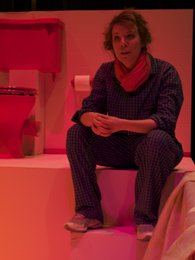Rita Ann Higgins’ poetry frequently tackles exclusion and survival in a voice characterised by irreverence and compassion. In both preoccupations and style, Face Licker Come Home – the first of Higgins’ six plays – is similarly imbued. Twenty-one years after its premiere, Mephisto Theatre Company revived the play for the fifth Galway Theatre Festival and, to mark this production, the author added a new scene.
Face Licker Come Home revolves around Ellen, a middle-aged woman who lives in her bathroom. She spends her time recounting her life with the titular estranged husband, and prepares for his return. As Ellen charts the gaping discrepancies between her expectations and the reality of marriage, she reflects on how she is both repelled and seduced by the Face Licker. Threaded through these memories, Ellen explores the fluidity of identity, warns against the dangers of back doors, and reveals that she measures her life in buttons.
 Lisa Smyth’s inviting set design – in light pink and dark purple – creates a strong sense of place. It consists of a bath on the right, a toilet across the back and a sink on the left. A photograph of Pope John XXIII above the toilet – illuminated by a searing white light for most of the play – dominates the set, seeming to scold Ellen when she confesses to the pleasures in surrendering to the Face Licker. The room’s fastidious cleanliness alludes to Ellen’s fractured state, but a tighter space would have underscored Ellen’s (presumable) claustrophobia.
Lisa Smyth’s inviting set design – in light pink and dark purple – creates a strong sense of place. It consists of a bath on the right, a toilet across the back and a sink on the left. A photograph of Pope John XXIII above the toilet – illuminated by a searing white light for most of the play – dominates the set, seeming to scold Ellen when she confesses to the pleasures in surrendering to the Face Licker. The room’s fastidious cleanliness alludes to Ellen’s fractured state, but a tighter space would have underscored Ellen’s (presumable) claustrophobia.
Dressed in blue checked pyjamas, white Asics runners and a pink scarf, Zita Monahan’s empathetic, endearing portrayal of Ellen forges a gentle intimacy with the audience. Monahan establishes a credibility that is essential for an audience to subscribe to Ellen’s eccentric logic (“That’s the problem with people – they’re always en route to somewhere. I’d rather stay here”) as she erects a clothesline in her bathroom or enunciates on the nuances of button interpretation. Making use of the entire set, the actor’s slow, stunted movements hint at the heavy medication that sustains Ellen.
Embodying the overall tenor of the production, Monahan’s deadpan, wry delivery accentuates the play’s black humour. This emphasis by co-directors Caroline Lynch and Emma O’Grady, however, slightly skews the production. Monahan’s persistently detached tone deflects emotional investment in the character and, to a large extent, obstructs Ellen’s fragility. The lack of tension between the character’s vulnerability and her tenacity becomes particularly apparent in the latter part of the production when the pace begins to falter.
In contrast, Mike Byrne’s lighting design creates effective switches in the mood of the production. Ellen’s reminiscences are regularly punctuated by verbal interruptions from the Face Licker (voiced by Fred McCloskey). It is the only time we get an alternative perspective (“No one unheard like Ellen did”) to Ellen’s version of events. During these sequences, Byrne drenches the stage in bloody pink hues while Ellen seems physically assaulted - doubled over the toilet or prostrate on the floor - by her husband’s claims. For the play’s denouement, penetrating, rapidly changing lighting and cacophonous, staccato sound effects (by Emma O’Grady) fuse to haunting effect.
It proves one of the highlights in this Mephisto production, which, while engaging, yields few new insights into Higgins’ offbeat, slight text.
Brendan Daly is a freelance arts journalist and critic for publications in Ireland and the U.S.